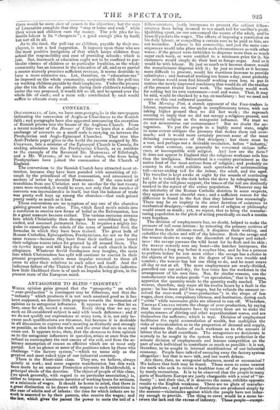CONVERTS.
OCCASIONALLY, of late, we have seen paragraphs in the newspapers intimating the conversion of Anglican Churchmen to the Romish faith ; and paragraphs have also appeared announcing the reception of Romish priests into the bosom of the Anglican Church. From a recent number of the Banner of Ulster we learn that a similar exchange of converts on a small scale is carrying on between the Presbyterian and Anglo-Episcopal Churches. That true blue Anti-Prelatic paper gives to the world the reasons assigned by Mr. COLEMAN, late a minister of the Episcopal Church in Canada, for seeking admission into the Presbyterian Church, as an antidote to the example of the Reverend Mr. MartsuaLL of Edinburgh, and a Mr. WINNING. of we know not where, who from being Presbyterians have joined the communion of the Church of England.
The conversions to the Romish Church have attracted most at- tention, because they have been paraded with something of tri- umph by the priesthood of that communion, and announced in accents of terror by alarmist Protestants. If the sum-total of transitions from one Christian sect to another for the last twenty years were recorded, it would be seen, not only that the number of converts was inconsiderab:e in itself, but that the balance of trade was pretty well kept up among the churches—that each gained pretty nearly as much as it lost.
These conversions are no symptom of any one of the churches gaining ground on the other. Fire, which fused men's minds into a condition to receive new forms of belief at the Reformation, has in a great measure become extinct. The various sectarian streams into which Christianity then diverged have consolidated as they cooled, and assumed permanent forms. It requires a mighty im- pulse to emancipate the minds of the mass of mankind from the formulas in which they have been trained. The great bulk of Roman Catholics, Episcopalians, Presbyterians, &c. are so for the same reason—because they have from their earliest years heard their religious tenets taken for granted by all around them. The via inertie keeps and will keep the mass of each church in their allegiance. Whatever fervid theologians may imagine, the sects into which Christendom has split will continue to coexist in their present proportions, unless some impulse external to them all come to alter their relations to each other and itself. And the ludicrous failure of the Theists of the French Revolution indicates how little likelihood there is of such an impulse being given, in the present state of the European mind.


























 Previous page
Previous page